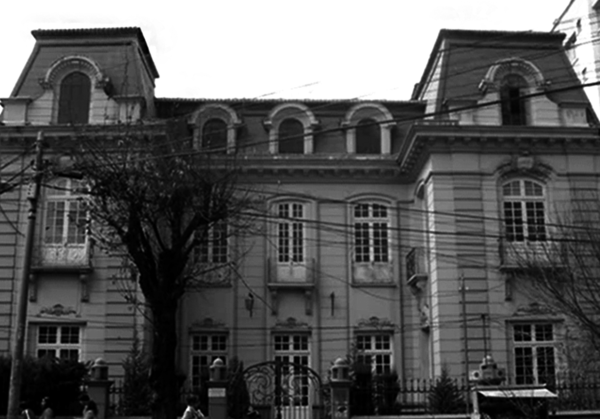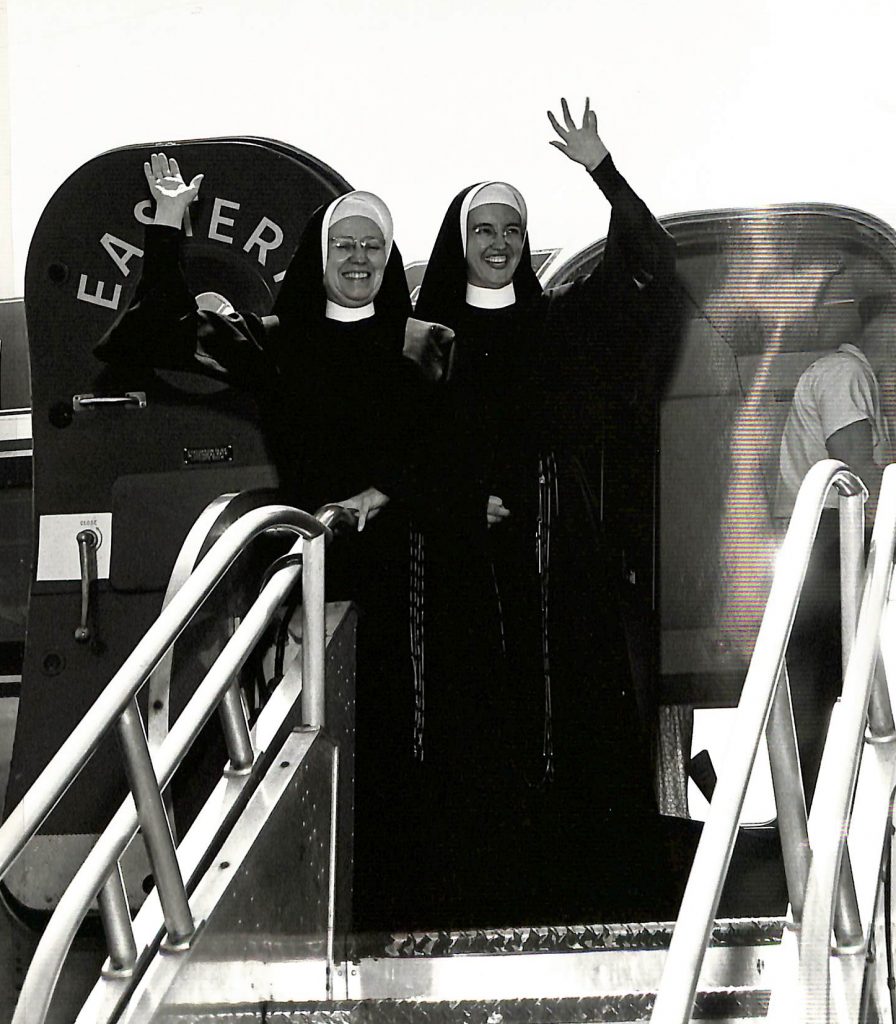Loretto in Bolivia: Planting seeds for compassionate change
Posted on July 1, 2022, by Christina Manweller

Photo courtesy of Loretto Archives
“We are in the city of La Paz, Bolivia, in a beautiful valley with an imposing mountain, the Illimani, which is the guardian of the city and at the same time marks its identity.
“Among the residents of this city, word spreads that a new school will open and it will be bilingual, English-Spanish. It will be run by nuns from the U.S.A. and two courses will be opened, kindergarten and first grade.” Thus writes Frida Pett, among the first students to attend Colegio
Loretto in La Paz.
In 1961, the Church asked religious communities in the U.S. to send 10% of their members to Latin America. Loretto already had a head start — the Community had committed to exploring new mission possibilities in South America, and in June of 1960, Mary Luke Tobin and Mary Peter Bruce had made an exploratory trip to Bolivia and Peru. The Most Rev. Abel Antezana y Rojas, Archbishop of La Paz, invited Loretto to open a bilingual school, and in November 1960, three sisters arrived in La Paz to open that school.
Mary Peter Bruce, Carol Dunphy and Eva Marie Salas located “a beautiful old building, four stories high. The rooms were easily turned into classrooms, a chapel and offices,” Mary Peter later wrote. They hired two lay teachers and Colegio Loretto opened in February 1961 with 132 kindergarten and first-grade students. Parents were eager to send their girls to the new school. After three years, 415 students were enrolled. Each year, new Loretto sisters would arrive to teach, staying for varying lengths of time.
The Sisters of Loretto who went to Bolivia to start a school dedicated themselves completely to educating us as strong and independent young women …. In those first 12 years, Colegio Loretto became one of the best private schools in La Paz and was known for providing an outstanding level of education.
Ximena Ferguson, member of Colegio Loretto’s first class
Inherent in the commitment to social justice was Loretto’s belief that an excellent education should not be for the privilege of the wealthy alone, and many attended Colegio Loretto tuition-free. Traditionally, private schools in Bolivia, even Catholic institutions, were for the affluent, so mixing families of diverse incomes pushed into unfamiliar territory, prodding hearts and minds to open.
While teaching the conventional subjects and encouraging critical thinking, the sisters wove into their lessons the realities of Bolivia’s social and economic injustices, teaching about the option for the poor and encouraging an active Christianity and commitment to service.
Jessie Vargas Maderholz writes that Lupe Arciniega (the fourth sister to arrive in La Paz, at 25 years of age) “sensitized us from a very young age to protect the homeless.”
Colegio Loretto students visited a mine where they witnessed inequities first-hand. “We went to the Bolivian Institute of Social Studies directed by the oblate priest Mauricio Lefebvre,” Jenny Ybarnegaray Ortiz writes. “There they opened the doors for us, showed us documents, lent us photographs, and with all that material we put together a kind of mural newspaper that exposed that reality. For us it was an impactful experience.”
Pat McCormick taught Jesus’ message of love and compassion and was able to expose the students, as she says, “to the struggles of the Indigenous families who lived in the barrios just a few miles from the school.”
It was not all serious business. Students remember the sisters encouraging interest in art, music, dance and sports.

Photo courtesy of Loretto Archives
As they settled in, the sisters became increasingly involved in helping Bolivians outside of the school. Mary Peter was active with Indigenous groups in the altiplano and oversaw the formation of deacons and their wives within the Aymara, becoming lifelong friends with many. She founded Radio San Gabriel in order to aid communication among the Aymara, training young women to produce the programs.
Through examples of love in action, the students were encouraged to develop a strong commitment to societal transformation; generations of lives were impacted as a result. The school’s graduates became teachers, psychologists, social workers, medical professionals, lawyers and so on. Many are lifelong volunteers, providing services to their communities and beyond. They’ve eagerly taught Loretto values to their families.
The sisters were young and full of energy, giving boundlessly of their knowledge, skill and compassion. The public school system was so inadequate that in addition to educating students, they dove into teaching Bolivian teachers and catechists, spreading their influence beyond Colegio Loretto.
They worked hard; in spite of their youth, the responsibilities and reality on the ground proved exhausting. Even so, Angie Murphy, who spent 10 years in Bolivia, and is remembered by Rosario Gutiérrez Costas driving students in the Volkswagen “school bus,” called these some of the happiest years of her life. She later wrote, “I always say that it was my favorite place to live.”
In the early 1970s the political situation made La Paz increasingly dangerous for sisters and staff — the school and convent had been searched and at one point, bullets blasted into the dining room. Loretto entered a process of turning over the school to a lay board that would continue to teach Loretto values; the school would go on as a Bolivian institution. Ximena Ferguson writes, “The education that Colegio Loretto was providing was ahead of its time, but by 1972 the authorities in government, the parent-teacher association and some of the parents perceived such education as revolutionary, and the activism of the sisters was viewed as an intrusion into national affairs.”
I venture to say that each and every one of the students of the class of 1972 has contributed … to the growth of justice in her environment, not only on a personal level but also achieving an impact on the population that she could influence.
Jessie Vargas Maderholz
During my life, I performed social work on a voluntary basis, supporting, for example, American military doctors who came to Bolivia through the embassy to perform surgical operations and medical evaluations for those without resources. I worked as a volunteer at the Children’s Hospital in La Paz Bolivia (eight years), also in the Spanish Red Cross; currently I work in the Order of Malta in Germany. I have worked in several United Nations agencies with paid contracts but always at the service of the needy.
Loretto’s legacy in Bolivia did not end with the sisters’ home-bound trips. Former students credit Colegio Loretto with providing an invaluable education, leading to impressive careers and, most importantly, helping to shape lives of compassion, service and deep commitment to social change.
Here are a few excerpts from the many messages of gratitude written by former students in commemoration of the 50th anniversary of Colegio Loretto’s first graduating class in 1972.
